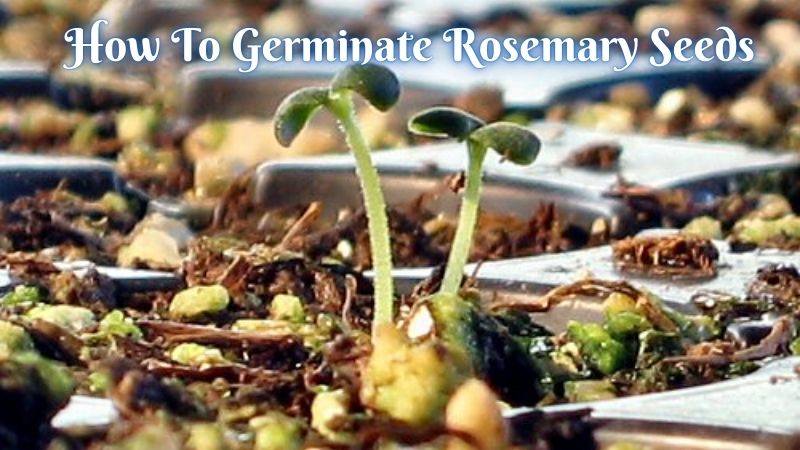Rosemary (Rosmarinus officinalis) is a popular aromatic herb that is widely used in cooking and medicine. Growing rosemary at home not only provides you with a fresh and delicious spice but also brings many health benefits and beautifies your living space. However, how to germinate rosemary seeds can be a challenge for many people, especially beginners. In this article, Garden Creatives will explore the detailed steps to help you successfully germinate rosemary seeds, thereby enjoying all the benefits that this wonderful herb has to offer.
How to Germinate Rosemary Seeds
Prepare the Seeds
Before you start, you need to prepare high-quality rosemary seeds. Seeds can be purchased from garden stores, supermarkets, or reputable seed websites.
Soak the Seeds
To increase the germination rate, you should soak the seeds in warm water for about 24 hours before sowing. This helps soften the seed coat, promoting the germination process.
Prepare the Soil
Rosemary grows best in loose, rich, well-drained soil. You can mix garden soil with sand and compost to create an ideal soil mix.
Sow the Seeds
After soaking the seeds, sow them into the soil surface about 1-2 cm apart. Rosemary seeds need light to germinate, so you don’t need to cover them too deeply. Just a thin layer of soil over the seeds will be enough.
Watering
Seeds need to be kept consistently moist to germinate. Use a spray bottle or drip irrigation system to keep the soil moist, but not too wet. Soil that is too wet can cause the seeds to rot.
Place the Seed Tray in a Bright Spot
Rosemary seeds need sunlight to germinate, so place the seed tray in a well-lit spot, but away from direct sunlight. The ideal temperature for germination is around 20-25°C.
Monitoring the Germination Process
Rosemary seeds usually take about 2-4 weeks to germinate. During this time, you need to be patient and continue to keep the soil moist. When the seedlings start to appear, you can move them outside or into larger pots to grow.
Caring for the Seedlings
When the seedlings have reached about 5-10 cm in height, you need to move them into separate pots or into the garden. Make sure that the new potting soil is also well-drained and rich in nutrients. Continue to water regularly and make sure the plant gets enough sunlight.
Pruning
When the rosemary plant starts to grow vigorously, you can prune it to encourage new branches and keep the plant in good shape. Pruning also helps to increase the growth of the plant.
Harvesting
Rosemary can be harvested all year round. You just need to cut off the branches you need to use and leave the base for the plant to continue growing. Rosemary can be used fresh or dried for long-term storage and use.
Common Problems with Rosemary Seed Germination and How to Fix Them
Seeds Not Germinating
Causes
Poor quality or expired seeds.
Insufficient soaking time or watering too hot.
Improper soil or improper watering.
Remedy
Buy seeds from a reputable source and check the expiration date before sowing.
Soak seeds in warm (not hot) water for 24 hours.
Make sure the soil is loose, well-drained, and kept moist.
Weak, Undeveloped Seedlings
Causes
Lack of light.
Lack of nutrients in the soil.
Over or under watering.
Remedy
Place the seed tray in a well-lit area but avoid strong sunlight.
Add organic fertilizer or liquid fertilizer to provide nutrients for the plant.
Check soil moisture regularly and adjust watering accordingly.
Plants Are Moldy or Pest-Infested
Causes:
The soil and surrounding environment are not clean.
Overwatering causes prolonged wetness.
Plants are attacked by pests.
Remedy:
Use clean soil and pots.
Water is just enough so that the soil is not wet for too long.
Check the plant regularly and remove diseased leaves, use organic pesticides if necessary.
Benefits of Growing Rosemary
Uses in Culinary
Rosemary is a wonderful spice, often used to marinate meat, poultry, and grilled dishes. Rosemary leaves can be used fresh or dried, both bringing a unique flavor to the dish.
Health Benefits
Rosemary is rich in antioxidants and other health-promoting compounds that help improve memory, reduce stress, and boost the immune system. Rosemary also has antibacterial properties, which can help prevent certain infections.
Beautify Your Living Space
Rosemary has a beautiful shape and a pleasant aroma, enhancing the beauty and appearance of your living space. You can grow rosemary in pots to decorate your home or garden.
Repel Insects
The scent of rosemary can repel some harmful insects such as mosquitoes and flies. Placing pots of rosemary in windows or doors will help protect your home from insects.
Conclusion
How to germinate rosemary seeds is not a difficult task if you follow the above instructions. With patience and proper care, you will have lush rosemary plants, ready to serve your culinary and medicinal needs.





